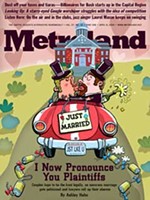Kanye West Flips the Script with a Bold Attempt at a Pop Record
Raw, uncensored expression of emotion is something the mainstream rap world has rarely seen, certainly not in recent years. So every time Kanye West throws a fit at an awards show you have to identify with him just a little. (Right?) That competitive spirit has driven him to produce three of the most fascinating rap records of the millennium -- 2005's Late Registration, in particular, where he proved he could make a record that works both as pop and hip-hop by hiring on a producer (Jon Brion) best known for his work with decidedly non-urban acts like Fiona Apple and Robyn Hitchcock. On 808s and Heartbreak, his fourth album in five years, West has made something close to an anti-hip-hop record. 808s is a strange and (almost) altogether unexpected left turn following the hit parade that was last year's Graduation -- it's more of a millennial techno-pop-meets-'80s-throwback thing. It's a difficult, brooding album (some have called it emo, and that's a fair assessment) that will likely be a divisive move for fans of the big, bouncy club sound that made West famous.
While rapping about "The Good Life" with T-Pain and enjoying the massive commercial success of Graduation, West was enduring a tough year personally: His mother passed away last November; in April, his 18-month engagement to designer Alexis Phifer was ended. In light of those events, West achieves an apex of unflinching introspection: Never have his experiences taken him down such dark corridors. Proper album-closer "Coldest Winter" (whose hook nicks the bleak pre-"Shout" Tears for Fears track "Memories Fade") is the only song specifically directed at his late mother; elsewhere, 808s falls in line with great breakup records like Dylan's Blood on the Tracks, Beck's Sea Change, or Elvis Costello's Blood and Chocolate.
He also continues his existential battle against materialism, as on "Welcome to Heartbreak" ("My friend showed me pictures of his kids/and all I could show him was pictures of my cribs"), though the theme is more of a lamentation on the loss of youth and innocence that's in fitting with the greater point.
But for a record that ostensibly chronicles his life falling out of his control, West has made the most disciplined record of his career, from a production standpoint. Gone are the big beats and flashy guest appearances. West made this record almost entirely himself using a classic Roland TR-808 Rhythm Composer to make the beats, which gives many of the tracks a distant, tribal feel. Fleshed out simply with bare-bones keyboard patterns (and precious few samples), the album sounds like it might have been made by West, for West, in his bedroom.
Also gone, for the most part, is the rapping.
The R&B world's obsession with Auto-Tune audio-processor technology is taken to an unusual end here -- West is not a great singer, so the processed vocals come off robotic and jerky. If he's trying to replicate the feeling of loneliness and isolation, it works. The few guests on 808s turn up to deliver rhymes that are on-point with the album's vibe: Young Jeezy's spot on "Amazing" sounds like Kanye toasting Kanye in the third person ("Look what he's been through/he deserves an applause"), while Lil Wayne's turn on the beat-free "See You in My Nightmares" musters a level of bile that West's own detached presence cannot.
It's a flawed release for sure -- West's sense of humor, one of his best qualities, is all but absent ("Street Lights" closes with West whining "Life's just not fair"; calling out a "spoiled little L.A. girl" on "RoboCop" isn't exactly poetry). But while the warts-and-all catharsis can be a little much, 808s and Heartbreak is a ballsy move. It's a hard album to connect with -- it'll be a sonic shock for those familiar with West's prior catalog -- but it's worth sticking with this record to witness the rebirth (by fire?) of an artist.
